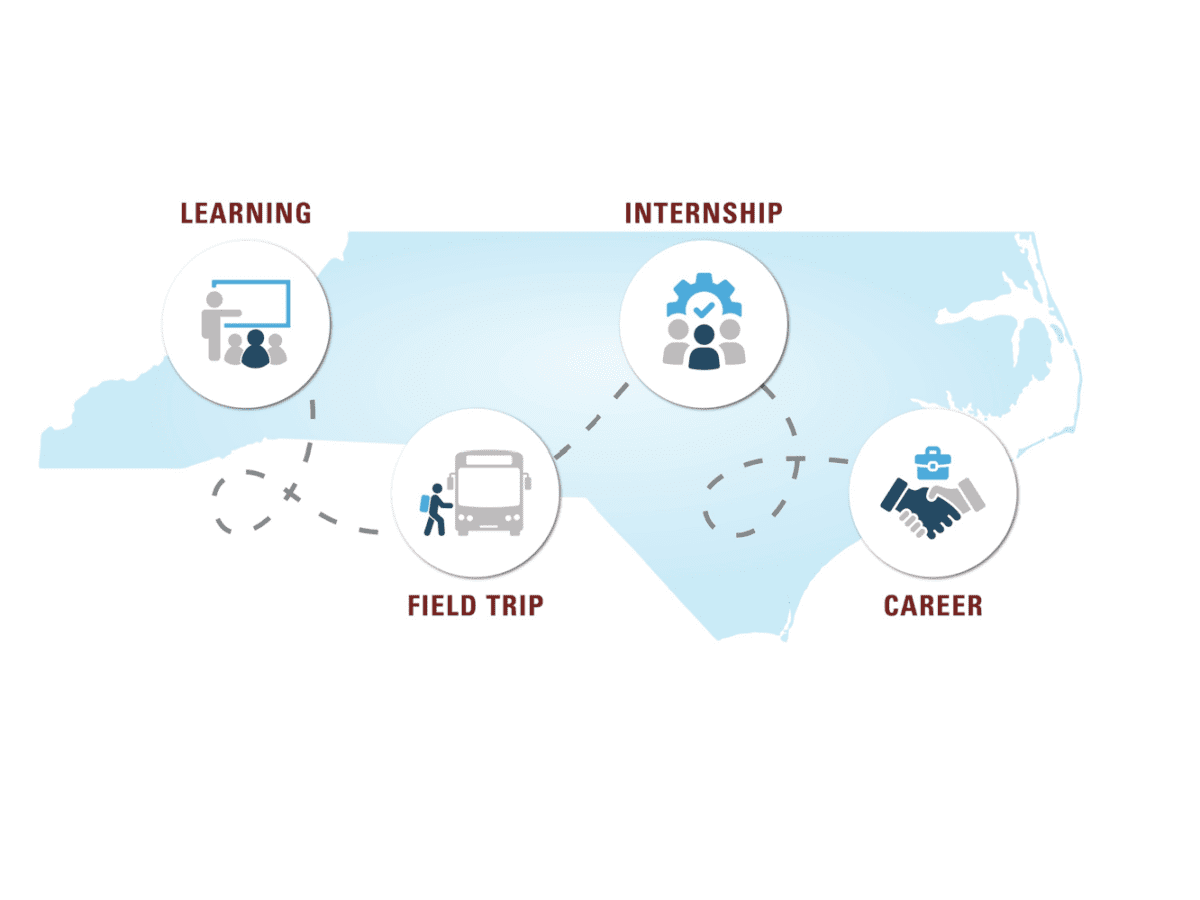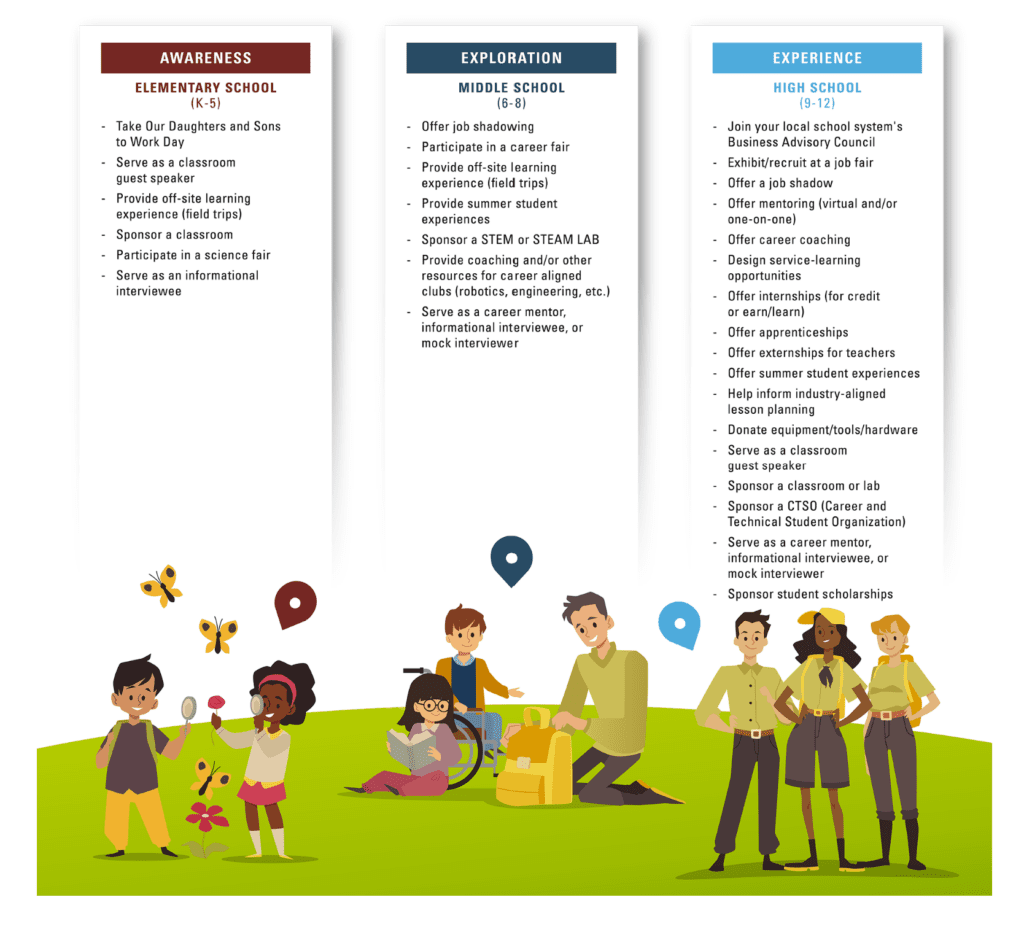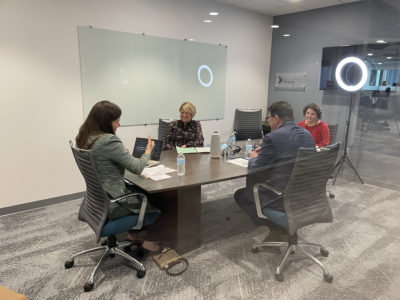
|
|
How can businesses get connected with schools?
Where and how do business leaders begin engaging schools?
How can employers begin an internship or youth apprenticeship program with a school?
With answers to these questions and more, a new toolkit is now available that businesses can use to establish partnerships with public schools across North Carolina, according to press releases from the N.C. Department of Public Instruction (DPI) and the N.C. Chamber.
State Superintendent Catherine Truitt joined N.C. Chamber CEO Gary Salamido this week to unveil North Carolina’s K-12 Talent Pipeline Toolkit, which lives on the Chamber’s website. EdNC’s Molly Urquhart interviewed both leaders to learn more.
This project is part of an ongoing partnership between DPI and the Chamber, and it’s a follow-up to the 2022 launch of “The Year of the Workforce,” where DPI rolled out four workforce goals and published its workforce development website.
Since its 2022 Year of the Workforce, DPI has launched tools aimed at increasing alignment with the business community, according to its press release. Some of these tools include the N.C. Portrait of a Graduate, which is designed to ensure that students are equipped with in-demand durable skills upon graduation, and the K-12 Workforce Toolkit, geared toward parents and students to help them learn more about career pathways available to them during their educational journey.
This toolkit was built in response to a survey sent to N.C. Chamber members. The survey identified where businesses were successfully connecting with schools and posed questions to identify priorities for future engagement. The number one request from respondents was the creation of an employer-focused toolkit featuring resources and opportunities to connect with schools, according to the Chamber’s press release.
Opportunities for partnership varies based on age of students
The toolkit provides concrete examples as to how businesses can partner with elementary (K-5), middle (6-8), and high school (9-12) students in age-appropriate ways through concepts of “awareness,” “exploration,” and “experience.”
For businesses interested in connecting with a nearby elementary school, engagement is about awareness, so students have a chance to explore careers through classroom guest speakers or science fair opportunities.
For businesses hoping to work with middle school students, their engagement should be focused on exploration so that students can learn more about multiple career pathways, says the toolkit. Local and regional businesses could offer an offsite field trip, a summer experience, participation in a career expo, or a job shadowing opportunity.
For businesses seeking to engage high school-aged students, partnerships should look to provide experiential learning opportunities such as career coaching, service-learning opportunities, or internships and/or youth apprenticeships.

Tools and next steps for businesses
Included in the toolkit is a “Tools and Next Steps” section where businesses can use the North Carolina Business Committee for Education (NCBCE) Navigator, which is provided at no cost to educators and employers and designed to connect classroom learning to career pathways.
“Through this platform employers post work-based learning engagement and information opportunities like career profiles, guest speakers, internships, and pre-apprenticeships. Educators can search for, request, and track their engagement through the platform,” says the Navigator.
The toolkit also provides a way for businesses to connect with local districts.
Videos of employer case studies are also included in the toolkit, with a spotlight on how districts like Union County Public Schools, Durham Public Schools, and Wilkes County Schools partnered with Carolina CAT, GlaxoSmithKline, and Atrium Health respectively.
Why this matters
“We know that one of the most important issues facing employers today is their future workforce,” Truitt said in the press release. “By engaging with employers and creating a resource that shows how they can partner with schools and connect with students, we are better able to match employer needs with North Carolina’s public school students — our future workforce. Ultimately, I want our students to be academically prepared and technically trained with the durable skills needed to succeed at any company, in every career, in college or the military. A fundamental way we accomplish this is through working directly with business and industry to ensure we’re helping students explore, engage and experience jobs of the future with potential employers.”
“As the nation’s top state for business, North Carolina boasts an incredibly diverse, innovative business community,” said Meredith Archie, president of the N.C. Chamber Foundation. “Making K-12 students aware of the opportunities available to them following graduation is a critical component to a strong workforce.”




